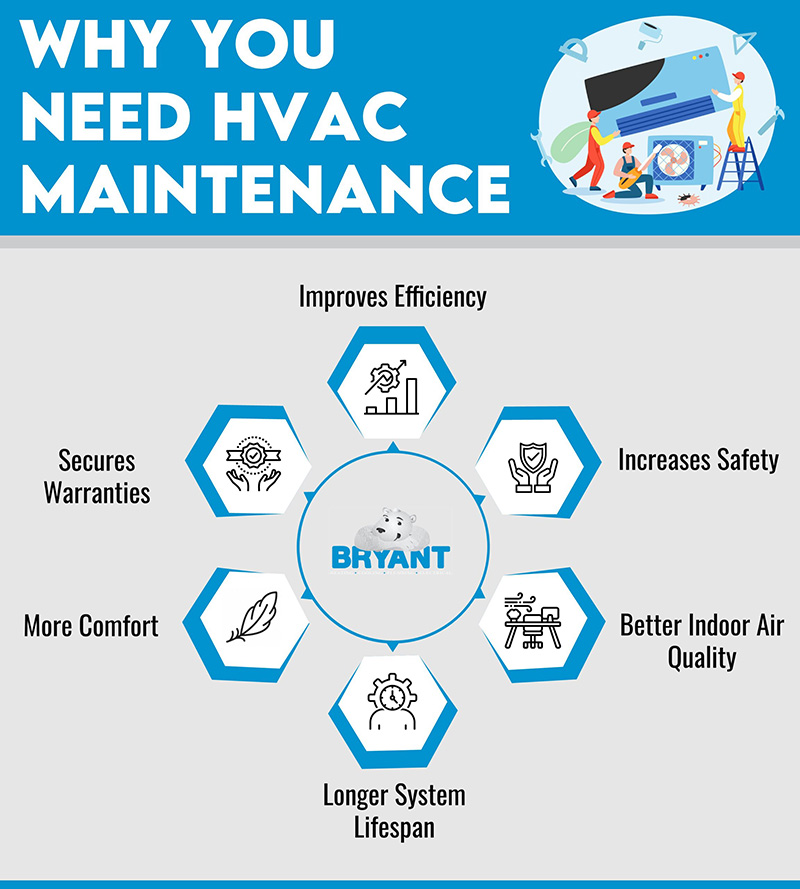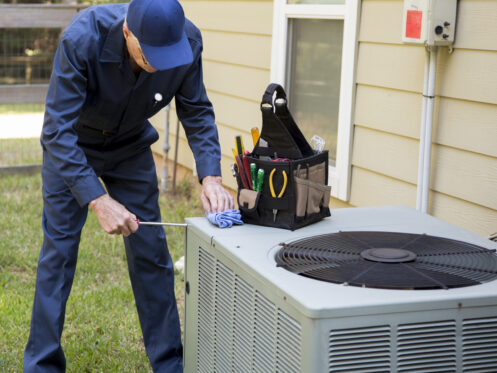When your HVAC system operates smoothly, it often fades into the background, quietly maintaining a comfortable home environment. However, keeping it running that way doesn’t happen by chance. Regular preventative maintenance is crucial for ensuring the system remains efficient and reliable over the years. By scheduling annual inspections and upkeep, homeowners can avoid unexpected breakdowns, improve energy efficiency, and extend the system’s lifespan. This blog will explore why consistent preventative maintenance is essential for an HVAC system and how it can prevent costly issues while maintaining comfort.
Efficiency
Even a small reduction in efficiency can add up quickly when your heating system or AC is running in the winter or summer. One preventative maintenance task you can do is ensure your system always has a clean filter. The U.S. Department of Energy suggests a dirty HVAC filter can reduce system efficiency by up to 15%. Experts recommend that you replace your heating and cooling system filter at least every three months. However, you may have to change yours more often based on factors such as how many people live in your household and whether you have pets. Many homeowners inspect their HVAC filters once a month to ensure they know when it is time to swap them out.
On the other hand, other tasks should be handled by a professional. During their visit, a technician will lubricate components such as the bearings in the fan and blower motors and pulley wheels. This process reduces friction that would otherwise interfere with your heating or cooling system’s smooth operation.
A technician will also recalibrate your system during their yearly visit. Even the best systems will experience some drift in their settings and how responsive the equipment is. Calibrating the controls and then checking the system’s performance will ensure that you’re getting the expected temperature.
Improved efficiency also keeps operating costs down. A well-tuned system should run fewer and shorter cycles, which means that your HVAC will use less fuel and electricity. People often assume that increasing utility bills are just due to rate hikes and overlook the declining efficiency of their heating and cooling systems. Spending a few dollars on preventative maintenance offsets costs incurred by running an inefficient system.
Safety
Alternatively, when inspecting your central air conditioner, a technician will tighten electrical connections to prevent electrical hazards. They will also look for issues with its float and pressure switches. A float switch shuts down the unit if there is a problem with the drainage system, while a pressure switch ensures the refrigerant pressure does not get too high.
Indoor Air Quality
Your heating and cooling system will get dirty over time, even when you practice good filter maintenance. During annual maintenance, a professional will clean the internal components of your heater or air conditioner. This task ensures that the inside of the unit is free of dust, pollen, and other pollutants that can significantly reduce indoor air quality.

A task you can do between maintenance visits to improve indoor air quality is to clean the return and supply vents in each room of your house. All you will need is a vacuum cleaner, brush, and dish soap. After removing the vent covers, scrub them with a stiff bristle brush and hot, soapy water, then rinse them off. While they are drying, vacuum inside the vent openings to clear dust and debris up to where your ductwork begins. Once you have replaced the vent covers, ensure that they are in the open position.
System Lifespan
Wear and tear will eventually take every HVAC system offline. However, you can usually get more years out of your HVAC with a preventative maintenance schedule. Lubrication will reduce wear inside moving components, and regular filter replacements will keep the system from straining to maintain your home’s temperature.
Another way a technician reduces the likelihood of damage that will shorten the lifespan of your system is by clearing the drainage system during their visit. Air conditioners and high-efficiency furnaces have a drain pan that captures the moisture they produce when they heat or cool your residence. The pan drains to the outdoors through a condensate line. Unfortunately, this line can become clogged or restricted due to dirt or algae growth. Clearing the drain pan and line ensures that water will not back up and cause harm to the system.
During their visit, a technician will also identify components like fan belts that have started to fail before they cause major damage. Getting faulty parts replaced early will reduce the risk that they will cause a series of failures that take out the entire HVAC.
Comfort
Your home’s HVAC system is there to keep you comfortable. While many people are okay with the settings drifting a little out of spec, this isn’t a good thing. An HVAC should heat and cool your home to the precise levels that you desire. The same goes for any attached dehumidification or humidification systems. Preventative maintenance checks are good times to verify that you’re getting the right level of comfort from your home’s HVAC. With a few tweaks to the HVAC, you might be surprised by the difference in how your home feels.
Warranties, Insurance and Documentation
Documenting the regular maintenance of your HVAC is sound proof if you ever need to submit a warranty claim. Many HVAC manufacturers expect owners to schedule preventative maintenance once a year. Otherwise, the manufacturer may say that it’s not responsible for a system failure because of inconsistent maintenance. A technician will log all of the preventative maintenance tasks they perform so you’ll have clear evidence that you’ve done your part.
The documentation is also helpful if you ever plan to sell your house. Future buyers will want to know what they’re getting into with the existing HVAC. When you keep up with annual HVAC maintenance, the documentation will go a long way toward assuaging potential buyers’ concerns.
Contact the Professionals
At Bryant Heating, Cooling, Plumbing & Electric, we have been serving the residents of Louisville, KY and the surrounding areas since 1940. Our family-owned and local business focuses on developing good customer relationships by providing quality craftsmanship and fair prices. We install, maintain, and repair heating and cooling systems, providing needed services like indoor air quality inspections. In addition, as your one-stop home-care specialists, we can help with all your plumbing needs, including drain cleaning, pipe repair, and installing water treatment solutions. Alternatively, you can count on us for your electrical needs such as rewiring, panel upgrades, and surge protection. Contact us today to schedule an appointment with one of our experienced team members.



